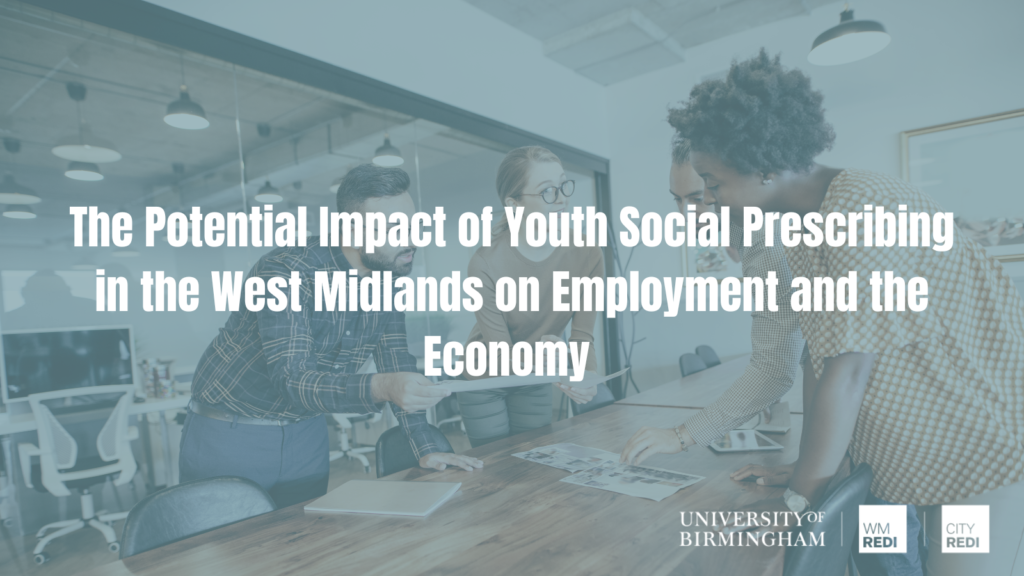
Joanne Mills from the University of Wolverhampton introduces the Institute for Community Research and Development’s new project with WMREDI to identify the potential impact of youth social prescribing within the West Midlands on employment and the economy. Visit the Institute for Community Research and Development webpage. Read the report and find out more about the project.
Social prescribing aims to help people access local, non-clinical services and activities provided by voluntary and community organisations in order to support their social, emotional and practical needs.
Research undertaken as part of a 15-month collaboration between the Institute of Community Research and Development (ICRD) at the University of Wolverhampton and the West Midlands Regional Economic Development Institute (WMREDI) seeks to examine existing social prescribing provision for young people in the West Midlands and its economic, and employability impact.
This project aims to consider the need for, benefits of, and potential barriers to, accessing social prescribing interventions for young people in the West Midlands, with a particular focus on its impact on employability and the local economy.

Research Digest
Researchers at the ICRD have published a research digest, which summarises a rapid scoping review of the need for, and provision of, social prescribing for young people in the region, together with presenting initial findings and recommendations for future work, which is further intended to inform and stimulate discussion with practitioners, policymakers, commissioners and researchers in the field.
This research digest forms part of an exploratory research project into social prescribing provision for young people in the West Midlands and its economic, and employability impact.
The key messages from our research to date are that:
- Dedicated social prescribing provision for children and young people is new but growing. There is currently little published evidence of its effectiveness, but research is underway to address this.
- There is potential for social prescribing to impact positively on the well-being of young people. While there is little tangible evidence to this effect currently, the novelty of this review concerns the further potential for impact on economic and employability aspects – and the links between these and well-being.
The topic of social prescribing for young people is gaining traction nationally, but there remains a need to collect evidence in order to understand its effectiveness.
Key Findings
Our project to date has comprised a rapid, desk-based scoping review of existing literature in the field of social prescribing provision for young people, predominantly within the West Midlands. Our key findings can be grouped into four themes:
| Theme | Description |
| Need | There is clearly a need for specific social prescribing services to be made available for young people in the West Midlands, to support existing formal provision for both mental health and wellbeing and for employment. |
| Provision | There is a lack of publicly available information on what social prescribing provision is available for young people in the West Midlands, and how it could support young people in the move away from benefits and into the workplace. Yet we know provision for young people does exist within the West Midlands. |
| Opportunities | The benefits of social prescribing (related to employment) can include developing personal skills, including building resilience and relationships, which could be transferable to the workplace. There is the potential for social prescribing to have benefits both for the individual and the economy, particularly from those services which focus on financial and employment support. These positive aspects of social prescribing would be of benefit to young people in the West Midlands. |
| Challenges | Barriers to young people accessing social prescribing include the cost and difficulty of travel, language barriers, and lack of cultural appropriateness. This can lead to young people, particularly those who identify as being from Global Majority groups, disabled and/or low income being excluded and thus feeling discouraged from taking part in social prescribing activities. |
Table 1: Key findings to date concerning youth social prescribing in the West Midlands and its potential for economic and employability impact
This multidisciplinary research project draws together and builds on ICRD’s recent work with community social prescribing providers (Massie et al., 2019) and with children and young people (Massie et al., 2015; 2018; 2019) to ensure the development of a new frontier of social prescribing is evidence-based from its inception to meet the needs of children and young people.
Working with our existing partners in the West Midlands, the project involves a review of existing evidence and – given the lack of practice and research in this area – draws on evidence from allied fields. New data will be collected to understand local needs and context and to ensure the design meets their needs in a realistic and practical way.

Recommendations
Our recommendations from this review are three-fold:
- Better understand the current provision of social prescribing for young people in the West Midlands that is not readily publicly accessible, and how employment features in this provision.
- Establish and develop effective coordinated social prescribing interventions for young people within the West Midlands that provides financial and employment support and involves young people in the design of the services – early intervention through appropriate youth social prescribing has the potential to have a long-lasting impact.
- Social providing schemes should have a robust method to track the effectiveness and impact of financial and employment support. While initial financial outlay on the provision of such services may be difficult in the current economic climate, our research shows that the economic benefits to both the individual and the region could potentially outweigh this, so it is important that there is the ability to capture this within monitoring data.
Next steps
Working with the ICRD and WMREDI’s existing partners in the West Midlands, the project will collect data to better understand existing local provisions. The next stages of this project will include the development of surveys to be circulated to organisations/individuals who provide social prescribing support in the West Midlands, and those who work with young people, in order to gain a clearer picture of how social prescribing provision can enable young people to make the move away from unemployment into further work or training.
Further, we will develop an evaluation framework to enable providers to monitor their activity and impact in this area and produce further outputs with the aim of making recommendations to policymakers both regionally and nationally.
Read the report and find out more about the project.
This blog was written by Joanne Mills, Research Associate ICRD, University of Wolverhampton.
Disclaimer:
The views expressed in this analysis post are those of the authors and not necessarily those of City-REDI, WMREDI or the University of Birmingham.
